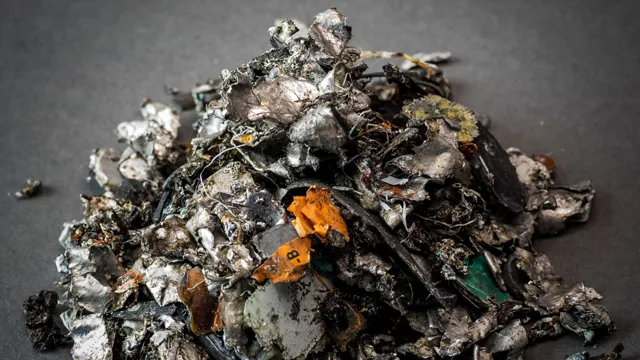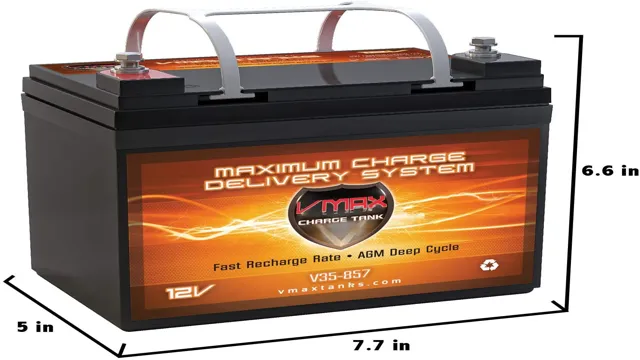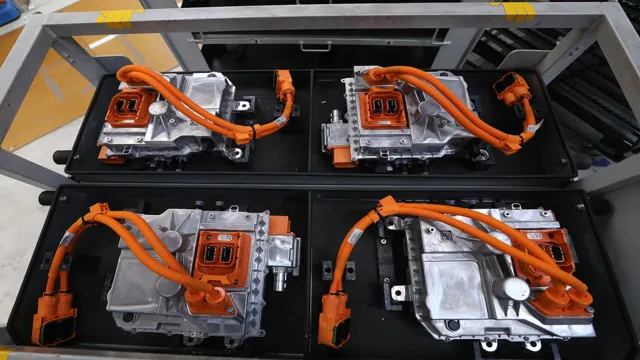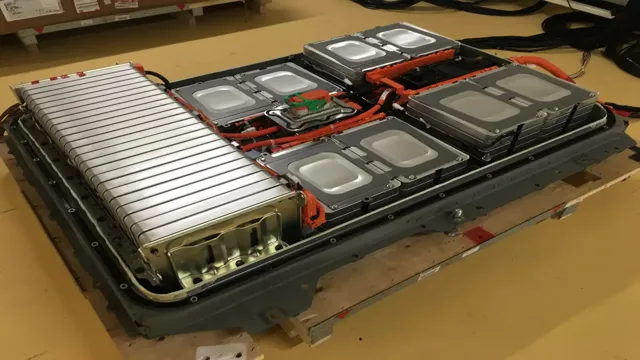Unveiling the Environmental Fallout of Electric Car Batteries: Examining the Impacts on Earth and Society
Electric cars have gained popularity for their eco-friendliness and cost-effectiveness, but are their batteries really an environmental hazard? This question has been debated among experts and car enthusiasts alike, causing confusion for those considering making the switch to electric vehicles. While it’s true that electric car batteries require rare and valuable minerals that need to be mined, the production process itself might be more eco-friendly than you think. Additionally, the batteries can be recycled after they’ve reached the end of their lifespan, which can reduce the need for new mining operations.
The question of whether electric car batteries are truly bad for the environment is a complex one, and the answer might not be as straightforward as you’d assume. In this blog, we will delve deep into the intricacies of electric car batteries and their environmental impact, giving you the knowledge you need to make an informed decision about electric cars.
Understanding the impact of battery production
It’s true that the production of electric car batteries can have a negative impact on the environment. The mining of materials like lithium, cobalt, and nickel can be destructive to natural habitats and require large amounts of energy. In addition, the manufacturing process of these batteries can release harmful chemicals into the air and water.
However, it’s important to note that the overall environmental impact of electric cars is still lower than that of traditional gas-powered vehicles. Electric cars produce zero emissions while driving and their batteries can be recycled or repurposed at the end of their lives. Additionally, advancements in battery technology are making them smaller, lighter, and more efficient, reducing their environmental impact even further.
So while electric car batteries may have some negative effects on the environment, they are still a crucial step towards reducing greenhouse gas emissions and fighting climate change.
Examining the raw material extraction process
When it comes to battery production, it’s important to understand the impact it has on the environment. One crucial element to consider is the raw material extraction process. For example, the mining of metals such as cobalt and lithium can result in deforestation, soil and water pollution, and harm to wildlife habitats.
In addition, the carbon footprint of transporting these materials is significant. To make matters worse, once the materials have been extracted, the manufacturing process of batteries can also be harmful, with the release of toxic chemicals and emissions. It’s crucial that we find more sustainable ways to produce batteries that minimize environmental damage.
As consumers, we can also do our part by recycling our old batteries properly, reducing our overall demand for new batteries and supporting companies that prioritize sustainability in their production processes.
Factoring in the energy used during manufacturing
As we continue to shift towards more sustainable modes of transportation, it’s important to consider the impact of battery production on the environment. One factor often overlooked is the amount of energy used during the manufacturing process. While electric vehicles are far cleaner to operate than traditional gas-powered cars, the production of their batteries can lead to significant carbon emissions.
The extraction and refinement of raw materials like lithium and cobalt—who are found in most EV batteries—are energy-intensive processes that contribute to our carbon footprint. However, this doesn’t mean we should give up on electric cars altogether. Instead, we should focus on creating more efficient and sustainable methods for manufacturing EV batteries, like using renewable energy sources and recycled materials.
By factoring in the energy used during battery production and taking steps to reduce it, we can make EVs even more environmentally friendly.
Comparing the environmental impact of electric vs gas-powered cars
There’s a common myth that electric car batteries are bad for the environment, but the reality is more complicated than that. Yes, the production of electric car batteries requires a significant amount of energy and resources, and the materials used in the batteries, such as lithium and cobalt, can have negative environmental impacts. However, when you compare the overall environmental impact of electric cars vs gas-powered cars, the former comes out ahead.
The production and transportation of gasoline for traditional cars releases large amounts of greenhouse gases, as does the process of refining oil into gasoline. Plus, electric cars themselves produce zero tailpipe emissions, making them a much cleaner choice for the environment. So, while it’s true that electric car batteries do have some environmental impact, it’s important to consider the bigger picture and weigh all the factors when comparing different types of cars.
Breaking down emissions from gasoline combustion
When it comes to comparing the environmental impact of electric versus gas-powered cars, one major factor to consider is the emissions from gasoline combustion. Gasoline-powered cars emit a variety of pollutants into the air, including carbon monoxide, nitrogen oxides, particulate matter, and volatile organic compounds. These pollutants can contribute to smog and air pollution, and can also have harmful health effects on humans and wildlife.
In contrast, electric cars produce zero emissions from their tailpipes, meaning they don’t contribute to air pollution or climate change in the same way that gas-powered cars do. So, for those concerned about reducing their environmental impact, making the switch to an electric car could be a smart choice.
Analyzing emissions generated during battery production
As electric cars become more prevalent in the market, one of the main concerns people have is the environmental impact of their production and use. Battery production typically accounts for the majority of emissions created during the manufacturing of electric vehicles. However, even when factoring in these emissions, electric cars still come out ahead in terms of environmental impact compared to gas-powered vehicles.
In fact, studies have found that electric vehicles produce significantly fewer emissions over their lifetime than their gas-powered counterparts. This is because even when accounting for emissions generated during battery production, electric cars produce fewer emissions when being driven due to their more efficient engines and the use of renewable energy sources to charge them. So, while there are certainly environmental considerations to keep in mind, choosing an electric car over a gas-powered one is still a more environmentally friendly choice in the long run.
Looking at the overall carbon footprint of both vehicles
When considering the environmental impact of our transportation choices, it’s important to look at the overall carbon footprint of both electric and gas-powered cars. While electric cars produce zero emissions on the road, they require electricity to charge, which may come from power plants that burn fossil fuels. On the other hand, gas-powered cars emit carbon dioxide and other pollutants while running on gasoline, but have become more efficient over the years with stricter emissions standards.
However, when looking at the whole lifecycle of a vehicle, from production to disposal, electric cars generally have a lower carbon footprint due to their efficient use of energy and the potential for renewable electricity sources. Ultimately, choosing a vehicle with a lower environmental impact can have a significant impact on our planet’s future.
Exploring solutions for reducing battery impact on the environment
Electric car batteries have long been considered harmful to the environment due to the resources needed to produce them and the limited options for disposal. However, companies are now exploring ways to mitigate these impacts and reduce their environmental footprint. One solution is to improve the recycling processes of electric car batteries, which can recover valuable metals and reduce the amount of waste.
Additionally, some car manufacturers are exploring the use of alternative materials for battery production, such as solid-state batteries or even graphene. These options have the potential to reduce the amount of mining required for battery production and ultimately improve the sustainability of electric vehicles. As the demand for electric cars continues to rise, it is crucial that companies prioritize finding eco-friendly solutions for battery production and disposal.
Highlighting advancements in battery recycling
As technology continues to advance, the demand for batteries has increased tremendously; however, this increase in consumption has also led to an increase in the negative environmental impact caused by battery waste. Thankfully, advancements in battery recycling processes have emerged as possible solutions to minimize this impact. Many companies are developing innovative ways of reusing or repurposing batteries, with the goal of minimizing the amount of waste that ends up in landfills.
For instance, some companies are using old battery cells to build new ones, while others are transforming battery materials into fertilizer or other valuable resources. The possibilities are limitless, and as more people become aware of these advancements, the hope is that fewer batteries will enter landfills, and our planet will become a cleaner, healthier place to live.
Discussing alternative and sustainable battery materials
As we continue to rely on batteries to power our daily lives, it’s becoming increasingly important to explore sustainable and environmentally-friendly options for their materials. Traditional lithium-ion batteries have significant environmental impacts, including the toxic chemicals used in their production and disposal. However, there are promising alternatives on the horizon, such as graphene and sodium-based batteries.
Graphene, a highly conductive and lightweight material, is being researched for its potential to improve battery efficiency and reduce waste. Sodium-based batteries, on the other hand, utilize readily available and non-toxic materials, making them a more sustainable option. As we seek to reduce the negative impact of battery production, it’s crucial that we continue to explore and invest in innovative solutions like these.
By focusing on sustainable battery materials, we can not only power our devices but also help protect the environment for future generations.
Conclusion and final thoughts
In conclusion, while electric car batteries do have negative environmental impacts, we must also consider the alternative. Would we rather continue pumping pollutants into the air and contributing to global warming, or take steps towards a greener future and work to mitigate the negative effects of electric car battery production? It’s a complex issue, but with innovation and careful consideration, we can continue to develop sustainable solutions and power towards a brighter, cleaner tomorrow. After all, if we’re going to have to deal with a bit of battery acid, we might as well do it while cruising down the highway emission-free!”
FAQs
What makes electric car batteries harmful to the environment?
The production and disposal of electric car batteries can release toxic chemicals and greenhouse gases into the environment, causing both immediate and long-term harm.
Are there any eco-friendly alternatives to electric car batteries?
Yes, some companies are experimenting with using alternative materials like hydrogen fuel cells as a more sustainable option for powering electric cars.
Can electric car batteries be safely recycled?
Currently, only a small percentage of electric car batteries are being recycled due to high costs and technical challenges. However, efforts to improve recycling methods are underway.
How can consumers reduce the environmental impact of electric car batteries?
Consumers can make an effort to reduce their overall energy consumption, maintain and repair their electric car batteries regularly, and properly recycle or dispose of them when they reach their end-of-life.





